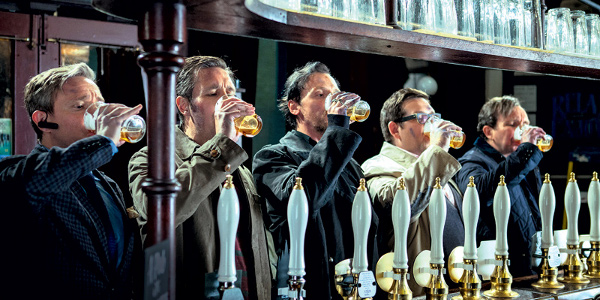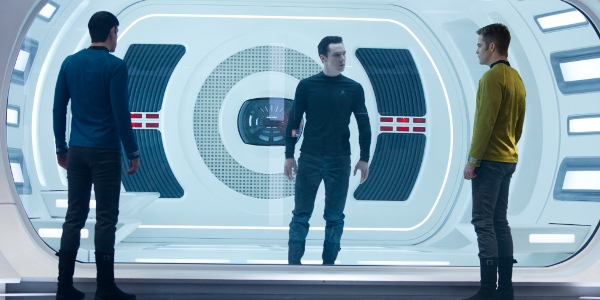Mission: Impossible – Rogue Nation (2015)
August 15, 2015 Leave a comment
 Having been on their tail for months, Impossible Mission Force agent Ethan Hunt thinks he finally has sufficient evidence to prove the existence of the mysterious Syndicate. Before he can report his findings, however, Hunt is kidnapped in London by Solomon Lane (Sean Harris) and interrogated by Ilsa Faust (Rebecca Ferguson), a disavowed MI6 agent of dubious loyalty, who nevertheless helps him escape, remaining behind so that she might purportedly protect her cover. Back in America, IMF agent William Brandt (Jeremy Renner) is defending the organisation against CIA director Alan Hunley (Alec Baldwin), but ultimately finds himself presiding over its dissolution as the government steps in to close it down. As a result, former agents Benji Dunn (Simon Pegg) and Luther Stickell (Ving Rhames) must commit treason to assist their old boss.
Having been on their tail for months, Impossible Mission Force agent Ethan Hunt thinks he finally has sufficient evidence to prove the existence of the mysterious Syndicate. Before he can report his findings, however, Hunt is kidnapped in London by Solomon Lane (Sean Harris) and interrogated by Ilsa Faust (Rebecca Ferguson), a disavowed MI6 agent of dubious loyalty, who nevertheless helps him escape, remaining behind so that she might purportedly protect her cover. Back in America, IMF agent William Brandt (Jeremy Renner) is defending the organisation against CIA director Alan Hunley (Alec Baldwin), but ultimately finds himself presiding over its dissolution as the government steps in to close it down. As a result, former agents Benji Dunn (Simon Pegg) and Luther Stickell (Ving Rhames) must commit treason to assist their old boss.
While Marvel’s Cinematic Universe goes to great pains to protect its continuity, burning bridges with auteurs and making concessions to other characters in order to create a comprehensive shared universe and integrate its various multimedia spin-offs, other studios seem to be taking a more laissez-faire approach to their own ongoing franchises. Films like Star Trek, Terminator Genisys and X-Men: Days of Future Past have all overtly addressed the issue of continuity by explicitly underwriting old timelines to keep their brands viable for continuation and accessible to new audiences, while the likes of Prometheus, Superman Returns and Casino Royale simply ignored the events of previous instalments to satisfy the whims of filmmakers. It’s a worrying trend that risks disenfranchising fans who have stuck with franchises from the very beginning, and undermines engagement in general as audiences don’t need to keep up with developments.
Christopher McQuarrie’s Mission: Impossible – Rogue Nation may not directly contradict its own continuity, but like every other film in the series it feels more like a standalone movie than a continuation of a series — another film about a threat to the IMF, only this time directed by someone else. The IMF’s roster of agents, meanwhile, continues to rotate without comment, while Hunt’s wife Julia (Michelle Monaghan) — featured prominently in Mission: Impossible III before being reduced to a mere cameo in Ghost Protocol — doesn’t feature at all. It seems strange then, given the number of characters who have been dropped over the years, that Rogue Nation brings back the actors that it does: Simon Pegg and Jeremy Renner may be bigger names than Jonathan Rhys Meyers or Paula Patton but they aren’t any more memorable or compelling (Pegg being almost unbearable at times) — though it’s admittedly good to see Ving Rhames back in action. J.J. Abrams’ Mission: Impossible III is arguably the best film in the series; the key to its success being the introduction of real emotion and high stakes into a saga that had previously been more concerned with surface style and gimmickry. (But then an actor like Philip Seymour Hoffman can do that for a film.) It’s disappointing to see the series slide back into inconsequence.
Enjoyed simply as the spy genre’s answer to Doctor Who — a silly nonsense in which nothing really matters and the most mundane of objects are imbued ludicrous new importance (a fingerprint activated vinyl, for instance) — however, Mission: Impossible – Rogue Nation is perfectly entertaining, perhaps even more so than Ghost Protocol. While that film is mostly remembered for the Dubai sequence, in which Cruise scaled the tallest tower in the world, the sequel boasts a handful of memorable moments including the heavily trailed Airbus sequence, but also a lung-busting underwater dive and a protracted chase through Casablanca that ends in a genuinely thrilling motorcycle ride through the Moroccan dessert. It also has a better mystery at its heart, though this has little to do with Sean Harris’ largely redundant role as villain, and the England-set finale featuring Tom Hollander as the British Prime Minister could conceivably fit within the framework of a more serious spy flick. Well, aside from the liberal use of digitally printed prosthesis. Rebecca Ferguson is another fine addition to the franchise, and hopefully her Ilsa Faust won’t be quite so unceremoniously dropped next time around.
With both Bond and Bourne now back in play, it’s reassuring to see Hunt raising his game again — and while the characters’ films might lag behind the best of the rest there’s no denying that Cruise himself is a force to be reckoned with, perhaps even more so than Daniel Craig and Matt Damon. If the franchise is really going to compete with 007 and Treadstone, however, it urgently needs to address its two biggest weaknesses: its forgettable villains and apparent disregard for emotional investment. Mission: Impossible VI should be a sequel to Mission: Impossible V.











